Tunisia Neurology Devices Market Outlook | Share, Companies, Growth, COVID-19 IMPACT, Industry, Value, Analysis, Trends, Size, Forecast & Revenue
| Product Code: ETC367674 | Publication Date: Aug 2022 | Updated Date: Apr 2025 | Product Type: Market Research Report | |
| Publisher: 6Wresearch | Author: Shubham Padhi | No. of Pages: 75 | No. of Figures: 35 | No. of Tables: 20 |
Tunisia Neurology Devices Market Size Growth Rate
The Tunisia Neurology Devices Market is projected to witness mixed growth rate patterns during 2025 to 2029. Growth accelerates to 4.15% in 2028, following an initial rate of 2.54%, before easing to 3.95% at the end of the period.

Neurology Devices Market: Tunisia vs Top 5 Major Economies in 2027 (Africa)
By 2027, the Neurology Devices market in Tunisia is anticipated to reach a growth rate of 3.83%, as part of an increasingly competitive Africa region, where Egypt remains at the forefront, supported by South Africa, Ethiopia, Algeria and Nigeria, driving innovations and market adoption across sectors.

Tunisia Neurology Devices Market Overview
The Tunisia Neurology Devices market encompasses medical devices and technologies used in the diagnosis and treatment of neurological disorders. Neurology devices include imaging systems (MRI, CT scanners), neurostimulation devices, diagnostic equipment, and therapeutic devices for conditions such as epilepsy, Parkinson`s disease, and stroke. Key trends include technological advancements in imaging resolution, minimally invasive neurosurgery techniques, and the integration of AI for enhanced diagnostics and personalized treatment planning.
Drivers of the market
The Tunisia Neurology Devices market is driven by the increasing prevalence of neurological disorders and the rising demand for advanced diagnostic and therapeutic solutions. Healthcare providers are investing in neurology devices such as EEG (Electroencephalography) machines, neurostimulation devices, and neuroimaging systems to improve patient outcomes and treatment efficacy. Technological advancements in device miniaturization, wireless connectivity, and AI-driven diagnostics further stimulate market expansion.
Challenges of the market
The Tunisia Neurology Devices market encounters challenges related to ensuring accurate diagnosis and treatment of neurological disorders. Addressing the high cost of neurology devices and maintaining quality standards in healthcare delivery present significant hurdles. Moreover, navigating regulatory approval processes and adapting devices to meet local healthcare infrastructure requirements are critical challenges. Patient education and awareness about neurology devices and therapies also influence market dynamics.
Government Policy of the market
Government policies in Tunisia support the Neurology Devices market by promoting regulatory frameworks that ensure patient safety and quality standards in medical device manufacturing. Initiatives focus on enhancing market access for neurology devices such as EEG machines, neurostimulation devices, and diagnostic equipment through certification and registration processes. Policies encourage collaboration between healthcare providers, regulatory authorities, and medical device manufacturers to facilitate technology adoption, improve healthcare outcomes, and address neurological disorders effectively.
Key Highlights of the Report:
- Tunisia Neurology Devices Market Outlook
- Market Size of Tunisia Neurology Devices Market, 2024
- Forecast of Tunisia Neurology Devices Market, 2031
- Historical Data and Forecast of Tunisia Neurology Devices Revenues & Volume for the Period 2018 - 2031
- Tunisia Neurology Devices Market Trend Evolution
- Tunisia Neurology Devices Market Drivers and Challenges
- Tunisia Neurology Devices Price Trends
- Tunisia Neurology Devices Porter's Five Forces
- Tunisia Neurology Devices Industry Life Cycle
- Historical Data and Forecast of Tunisia Neurology Devices Market Revenues & Volume By Product for the Period 2018 - 2031
- Historical Data and Forecast of Tunisia Neurology Devices Market Revenues & Volume By Neurostimulation Devices for the Period 2018 - 2031
- Historical Data and Forecast of Tunisia Neurology Devices Market Revenues & Volume By Neurosurgery Devices for the Period 2018 - 2031
- Historical Data and Forecast of Tunisia Neurology Devices Market Revenues & Volume By Interventional Neurology Devices for the Period 2018 - 2031
- Historical Data and Forecast of Tunisia Neurology Devices Market Revenues & Volume By Cerebrospinal fluid management devices for the Period 2018 - 2031
- Historical Data and Forecast of Tunisia Neurology Devices Market Revenues & Volume By Others for the Period 2018 - 2031
- Historical Data and Forecast of Tunisia Neurology Devices Market Revenues & Volume By End User for the Period 2018 - 2031
- Historical Data and Forecast of Tunisia Neurology Devices Market Revenues & Volume By Hospitals for the Period 2018 - 2031
- Historical Data and Forecast of Tunisia Neurology Devices Market Revenues & Volume By Ambulatory surgery centers for the Period 2018 - 2031
- Historical Data and Forecast of Tunisia Neurology Devices Market Revenues & Volume By Neurology clinics for the Period 2018 - 2031
- Tunisia Neurology Devices Import Export Trade Statistics
- Market Opportunity Assessment By Product
- Market Opportunity Assessment By End User
- Tunisia Neurology Devices Top Companies Market Share
- Tunisia Neurology Devices Competitive Benchmarking By Technical and Operational Parameters
- Tunisia Neurology Devices Company Profiles
- Tunisia Neurology Devices Key Strategic Recommendations
Frequently Asked Questions About the Market Study (FAQs):
- Single User License$ 1,995
- Department License$ 2,400
- Site License$ 3,120
- Global License$ 3,795
Search
Related Reports
- Saudi Arabia Manlift Market (2025-2031) | Outlook, Size, Growth, Trends, Companies, Industry, Revenue, Value, Share, Forecast & Analysis
- Uganda Excavator, Crane, and Wheel Loaders Market (2025-2031) | Strategy, Consumer Insights, Analysis, Investment Trends, Opportunities, Growth, Size, Share, Industry, Revenue, Segments, Value, Segmentation, Supply, Forecast, Restraints, Outlook, Competition, Drivers, Trends, Demand, Pricing Analysis, Competitive, Strategic Insights, Companies, Challenges
- Rwanda Excavator, Crane, and Wheel Loaders Market (2025-2031) | Strategy, Consumer Insights, Analysis, Investment Trends, Opportunities, Growth, Size, Share, Industry, Revenue, Segments, Value, Segmentation, Supply, Forecast, Restraints, Outlook, Competition, Drivers, Trends, Demand, Pricing Analysis, Competitive, Strategic Insights, Companies, Challenges
- Kenya Excavator, Crane, and Wheel Loaders Market (2025-2031) | Strategy, Consumer Insights, Analysis, Investment Trends, Opportunities, Growth, Size, Share, Industry, Revenue, Segments, Value, Segmentation, Supply, Forecast, Restraints, Outlook, Competition, Drivers, Trends, Demand, Pricing Analysis, Competitive, Strategic Insights, Companies, Challenges
- Angola Excavator, Crane, and Wheel Loaders Market (2025-2031) | Strategy, Consumer Insights, Analysis, Investment Trends, Opportunities, Growth, Size, Share, Industry, Revenue, Segments, Value, Segmentation, Supply, Forecast, Restraints, Outlook, Competition, Drivers, Trends, Demand, Pricing Analysis, Competitive, Strategic Insights, Companies, Challenges
- Israel Intelligent Transport System Market (2025-2031) | Strategy, Consumer Insights, Analysis, Investment Trends, Opportunities, Growth, Size, Share, Industry, Revenue, Segments, Value, Segmentation, Supply, Forecast, Restraints, Outlook, Competition, Drivers, Trends, Demand, Pricing Analysis, Competitive, Strategic Insights, Companies, Challenges
- Uganda Precast and Aggregate Market (2025-2031) | Strategy, Consumer Insights, Analysis, Investment Trends, Opportunities, Growth, Size, Share, Industry, Revenue, Segments, Value, Segmentation, Supply, Forecast, Restraints, Outlook, Competition, Drivers, Trends, Demand, Pricing Analysis, Competitive, Strategic Insights, Companies, Challenges
- Australia IT Asset Disposal Market (2025-2031) | Strategy, Consumer Insights, Analysis, Investment Trends, Opportunities, Growth, Size, Share, Industry, Revenue, Segments, Value, Segmentation, Supply, Forecast, Restraints, Outlook, Competition, Drivers, Trends, Demand, Pricing Analysis, Competitive, Strategic Insights, Companies, Challenges
- UAE Building Thermal Insulation Market Outlook (2025-2031) | Revenue, Companies, Share, Trends, Growth, Size, Forecast, Industry, Analysis & Value
- Portugal Electronic Document Management Market (2025-2031) | Strategy, Consumer Insights, Analysis, Investment Trends, Opportunities, Growth, Size, Share, Industry, Revenue, Segments, Value, Segmentation, Supply, Forecast, Restraints, Outlook, Competition, Drivers, Trends, Demand, Pricing Analysis, Competitive, Strategic Insights, Companies, Challenges
Industry Events and Analyst Meet
Our Clients
Whitepaper
- Middle East & Africa Commercial Security Market Click here to view more.
- Middle East & Africa Fire Safety Systems & Equipment Market Click here to view more.
- GCC Drone Market Click here to view more.
- Middle East Lighting Fixture Market Click here to view more.
- GCC Physical & Perimeter Security Market Click here to view more.
6WResearch In News
- Doha a strategic location for EV manufacturing hub: IPA Qatar
- Demand for luxury TVs surging in the GCC, says Samsung
- Empowering Growth: The Thriving Journey of Bangladesh’s Cable Industry
- Demand for luxury TVs surging in the GCC, says Samsung
- Video call with a traditional healer? Once unthinkable, it’s now common in South Africa
- Intelligent Buildings To Smooth GCC’s Path To Net Zero













